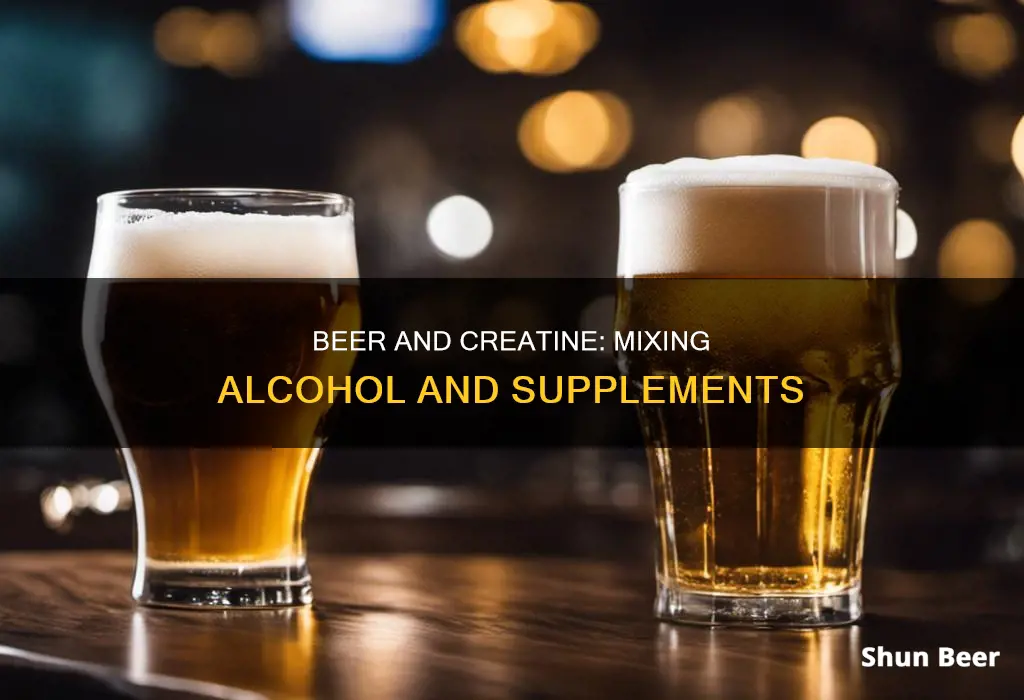
Creatine is a compound that helps energise your muscles and hydrate your cells. It is produced in the body in the liver, pancreas, and kidneys, and can also be sourced from red meat and fish. Alcohol, on the other hand, is a toxin that can cause dehydration and negatively impact muscle growth and recovery. So, what happens when you consume both?
While there is limited research on the direct interaction between creatine and alcohol, some studies suggest that they do not complement each other. Alcohol inhibits protein synthesis, which is essential for muscle growth and recovery. It also affects the release of growth hormones and insulin, which are crucial for inducing protein synthesis after exercise. Creatine, on the other hand, stimulates protein synthesis and provides energy for explosive activities. Therefore, consuming alcohol while taking creatine may limit or cancel out its benefits.
Additionally, alcohol and creatine both impact hydration. Alcohol is a diuretic, which means it can cause dehydration, especially when combined with intense workouts. Creatine, meanwhile, requires plenty of water to help maintain, build, and restore muscles effectively. As a result, drinking alcohol and taking creatine may not be the best combination for optimising your workout routine and overall health.
| Characteristics | Values |
|---|---|
| Effect on muscle growth | Alcohol hinders muscle growth by inhibiting protein synthesis and interfering with the anabolic properties of insulin and growth hormone. |
| Effect on muscle recovery | Alcohol slows down muscle repair and recovery. |
| Effect on coordination | Alcohol reduces reaction time, stamina, strength, power and speed. |
| Effect on hydration | Alcohol is a diuretic and can cause dehydration. Creatine, on the other hand, requires lots of water to help the body build and maintain muscle. |
| Effect on nutrient absorption | Alcohol decreases the body's ability to absorb nutrients. |
| Effect on liver | Alcohol can damage the liver, which is also involved in processing creatine. |
| Effect on kidneys | Alcohol affects the kidneys' ability to filter toxic substances from the blood. Creatine is primarily filtered by the kidneys. |
| Effect on brain | Alcohol can cause neurological effects. Creatine is also stored in the brain. |
What You'll Learn

Alcohol can cause dehydration, which is bad for creatine absorption
Alcohol is a diuretic, which means it increases the rate at which your body loses water. This can lead to dehydration, which in turn reduces muscle performance and makes you more susceptible to injury. Dehydration also reduces the efficacy of creatine supplements, as creatine needs plenty of water to help your body build and maintain muscle. When there isn't enough water available, you don't get the maximum benefit from your creatine supplement.
Alcohol can also cause painful muscle cramps and pain, and in serious cases, it can damage the muscles, liver, and kidneys. Creatine can aid in muscle recovery, but it is ineffective when dehydration is present. For this reason, it's important to avoid regular, excessive alcohol consumption when taking creatine supplements.
Drinking alcohol can also affect how your body absorbs and uses creatine supplements, making them less useful. Additionally, drinking too much alcohol can cause you to lose water, which makes creatine supplements even less effective. This can hinder athletic performance and reduce muscle growth.
To ensure proper hydration when taking creatine supplements, it's important to drink plenty of water and avoid alcohol, especially right after a workout. If you do choose to drink alcohol while taking creatine, it's crucial to drink in moderation, stay properly hydrated, and make sure your creatine supplement is NSF Certified for Sport.
The Magical Math of 79 Beers: Age Subtraction Mystery
You may want to see also

Alcohol may slow down muscle repair and recovery
Furthermore, alcohol reduces the body's absorption of nutrients, including calcium, magnesium, iron, zinc, and B vitamins, which are vital for athletic performance and muscle recovery. Alcohol also interferes with the body's ability to properly digest and absorb critical vitamins, minerals, and macronutrients, hindering muscle recovery.
Moreover, alcohol consumption can lead to dehydration, as it acts as a diuretic, causing the body to lose water and essential electrolytes. Dehydration can further impede muscle recovery and increase the risk of muscle cramps and injuries.
Finally, alcohol can disrupt hormonal balance by increasing cortisol levels and decreasing testosterone levels, which can impair the anabolic-catabolic balance, leading to decreased recovery and performance. Overall, while moderate alcohol consumption may not significantly affect muscle repair and recovery, excessive drinking can hinder the process and negatively impact athletic performance.
Gas Blending: How Does a Beer Gas Blender Work?
You may want to see also

Alcohol can hinder the process of protein synthesis
Alcohol can have a detrimental effect on muscle building, which is the opposite of what creatine does. When you lift weights, you are damaging and breaking down your muscles. The actual muscle growth occurs when you're resting via a process called protein synthesis. Alcohol hinders this process.
Protein synthesis is the production of new muscle proteins. When you're building muscle, you are aiming to rebuild more muscle than you damaged during your workout. Creatine stimulates protein synthesis, but alcohol hinders it.
A study showed that when physically active men consumed 1.5g/kg of alcohol after exercise, there was a significant reduction in muscle protein synthesis (37%). Even when 20-30g of protein was consumed in combination with alcohol, muscle protein synthesis was still reduced by 24%.
Alcohol also reduces insulin resistance, which is a stimulator of muscle growth. Insulin is responsible for the absorption of carbohydrates into muscles. With limited absorption ability, muscle growth and recovery are impaired.
Enjoying Beers Responsibly on Work Nights: A Guide
You may want to see also

Alcohol can increase the risk of injury
Alcohol also plays a significant role in intentional injuries, such as interpersonal violence and self-harm. It impairs judgment and increases the risk of physical assault, both as a perpetrator and a victim. Alcohol is also a factor in a large number of criminally violent acts, especially when the victim and attacker know each other.
Overall, alcohol-related injuries represent a significant economic and social burden globally and are preventable through effective interventions and policies.
Beer and Plasma: What's the Safe Combination?
You may want to see also

Alcohol can affect the organs that make creatine
Alcohol can have a detrimental impact on the organs that produce creatine, namely the kidneys and liver. When the body is processing alcohol, the absorption and digestion of creatine are hindered, reducing its efficacy.
The liver and kidneys are the organs that produce and utilise creatine. These organs are also the most directly impacted by excessive alcohol intake. The body's ability to process creatine is diminished when it is working overtime to process alcohol. This means that the benefits of creatine, such as muscle growth and recovery, are lessened when combined with alcohol.
Alcohol also acts as a diuretic, drawing water from tissues and leading to dehydration. This can cause painful muscle cramps and, in severe cases, damage to the muscles, liver, and kidneys. Creatine requires adequate hydration to be effective, as it pulls water into cells to build muscle. Therefore, alcohol's dehydrating effects can reduce creatine's benefits.
In addition, alcohol can negatively impact the body's ability to absorb nutrients, including protein and amino acids, which are essential for muscle building and recovery. This can further hinder the benefits of creatine.
The Fizziness in Beer: How Carbonation Works
You may want to see also







